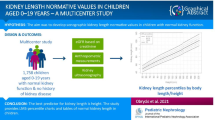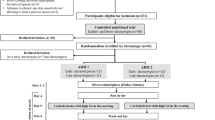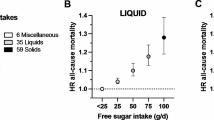Abstract
Sodium is the most abundant extracellular cation and therefore pivotal in determining fluid balance. At the beginning of life, a positive sodium balance is needed to grow. Newborns and preterm infants tend to lose sodium via their kidneys and therefore need adequate sodium intake. Among older children and adults, however, excessive salt intake leads to volume expansion and arterial hypertension. Children who are overweight, born preterm, or small for gestational age and African American children are at increased risk of developing high blood pressure due to a high salt intake because they are more likely to be salt sensitive. In the developed world, salt intake is generally above the recommended intake also among children. Although a positive sodium balance is needed for growth during the first year of life, in older children, a sodium-poor diet seems to have the same cardiovascular protective effects as among adults. This is relevant, since: (1) a blood pressure tracking phenomenon was recognized; (2) the development of taste preferences is important during childhood; and (3) salt intake is often associated with the consumption of sugar-sweetened beverages (predisposing children to weight gain).



Similar content being viewed by others
References
Pickering TG (2002) The history and politics of salt. J Clin Hypertens (Greenwich) 4:226–228
Kotchen TA, Cowley AW Jr, Frohlich ED (2013) Salt in health and disease–a delicate balance. N Engl J Med 368:1229–1237
Ritz E, Mehls O (2009) Salt restriction in kidney disease–a missed therapeutic opportunity? Pediatr Nephrol 24:9–17
Hill LL (1990) Body composition, normal electrolyte concentrations, and the maintenance of normal volume, tonicity, and acid-base metabolism. Pediatr Clin N Am 37:241–256
Forbes GB, Lewis AM (1956) Total sodium, potassium and chloride in adult man. J Clin Invest 35:596–600
Finberg L, Kravath RE, Hellerstein S (1993) Water and electrolytes in pediatrics—physiology, pathophysiology and treatment, 2nd edn. Saunders, Philadelphia, pp 68–69
Holtback U, Aperia AC (2003) Molecular determinants of sodium and water balance during early human development. Semin Neonatol 8:291–299
Wadei HM, Textor SC (2012) The role of the kidney in regulating arterial blood pressure. Nat Rev Nephrol 8:602–609
Rocchini AP, Key J, Bondie D, Chico R, Moorehead C, Katch V, Martin M (1989) The effect of weight loss on the sensitivity of blood pressure to sodium in obese adolescents. N Engl J Med 321:580–585
Frisoli TM, Schmieder RE, Grodzicki T, Messerli FH (2011) Beyond salt: lifestyle modifications and blood pressure. Eur Heart J 32:3081–3087
Khundmiri SJ (2014) Advances in understanding the role of cardioglycosides in renal control of salt homeostasis. J Endocrinol. doi:10.1530/JOE-13-0613
Simonetti GD, Mohaupt MG, Bianchetti MG (2012) Monogenic forms of hypertension. Eur J Pediatr 171:1433–1439
Meneton P, Jeunemaitre X, de Wardener HE, MacGregor GA (2005) Links between dietary salt intake, renal salt handling, blood pressure, and cardiovascular diseases. Physiol Rev 85:679–715
Titze J (2014) Sodium balance is not just a renal affair. Curr Opin Nephrol Hypertens 23:101–105
Marvar PJ, Gordon FJ, Harrison DG (2009) Blood pressure control: salt gets under your skin. Nat Med 15:487–488
Guignard JP (1982) Renal function in the newborn infant. Pediatr Clin N Am 29:777–790
Herin P, Aperia A (1994) Neonatal kidney, fluids, and electrolytes. Curr Opin Pediatr 6:154–157
Gattineni J, Baum M (2013) Developmental changes in renal tubular transport-an overview. Pediatr Nephrol. doi:10.1007/s00467-013-2666-6
Al-Dahhan J, Haycock GB, Nichol B, Chantler C, Stimmler L (1984) Sodium homeostasis in term and preterm neonates. III. Effect of salt supplementation. Arch Dis Child 59:945–950
Marrero NM, He FJ, Whincup P, MacGregor GA (2014) Salt intake of children and adolescents in South London: consumption levels and dietary sources. Hypertension 63:1026–1032
He FJ, Marrero NM, MacGregor GA (2008) Salt and blood pressure in children and adolescents. J Hum Hypertens 22:4–11
Yang Q, Zhang Z, Kuklina EV, Fang J, Ayala C, Hong Y, Loustalot F, Dai S, Gunn JP, Tian N, Cogswell ME, Merritt R (2012) Sodium intake and blood pressure among US children and adolescents. Pediatrics 130:611–619
Brown IJ, Tzoulaki I, Candeias V, Elliott P (2009) Salt intakes around the world: implications for public health. Int J Epidemiol 38:791–813
He FJ, MacGregor GA (2006) Importance of salt in determining blood pressure in children: meta-analysis of controlled trials. Hypertension 48:861–869
Birch LL, Fisher JO (1998) Development of eating behaviors among children and adolescents. Pediatrics 101:539–549
Miersch A, Vogel M, Gausche R, Siekmeyer W, Pfaffle R, Dittrich K, Kiess W (2013) Blood pressure tracking in children and adolescents. Pediatr Nephrol 28:2351–2359
Mancia G, Fagard R, Narkiewicz K, Redon J, Zanchetti A, Bohm M, Christiaens T, Cifkova R, De Backer G, Dominiczak A, Galderisi M, Grobbee DE, Jaarsma T, Kirchhof P, Kjeldsen SE, Laurent S, Manolis AJ, Nilsson PM, Ruilope LM, Schmieder RE, Sirnes PA, Sleight P, Viigimaa M, Waeber B, Zannad F (2013) 2013 ESH/ESC Guidelines for the management of arterial hypertension: the Task Force for the management of arterial hypertension of the European Society of Hypertension (ESH) and of the European Society of Cardiology (ESC). J Hypertens 31:1281–1357
Wilson DKC, Coulon S (2011) Influence of dietary electrolytes on childhood blood pressure. In: Flynn JT, Ingelfinger JR, Portman RJ (eds) Pediatric hypertension, 2nd edn. Springer, New York, pp 259–289
Sasaki N (1979) The salt factor in apoplexy and hypertension: epidemiological studies in Japan. In: Yamori Y (ed) Prophylactic approach to hypertensive diseases. Raven, New York, pp 467–474
Falkner B, Daniels SR (2004) Summary of the fourth report on the diagnosis, evaluation, and treatment of high blood pressure in children and adolescents. Hypertension 44:387–388
Appel LJ, Moore TJ, Obarzanek E, Vollmer WM, Svetkey LP, Sacks FM, Bray GA, Vogt TM, Cutler JA, Windhauser MM, Lin PH, Karanja N (1997) A clinical trial of the effects of dietary patterns on blood pressure. DASH Collaborative Research Group. N Engl J Med 336:1117–1124
Sacks FM, Svetkey LP, Vollmer WM, Appel LJ, Bray GA, Harsha D, Obarzanek E, Conlin PR, Miller ER 3rd, Simons-Morton DG, Karanja N, Lin PH; DASH-Sodium Collaborative Research Group (2001) Effects on blood pressure of reduced dietary sodium and the Dietary Approaches to Stop Hypertension (DASH) diet. DASH-Sodium Collaborative Research Group. N Engl J Med 344:3–10
Geleijnse JM, Grobbee DE, Hofman A (1990) Sodium and potassium intake and blood pressure change in childhood. BMJ 300:899–902
Wilson DK, Sica DA, Miller SB (1999) Effects of potassium on blood pressure in salt-sensitive and salt-resistant black adolescents. Hypertension 34:181–186
He FJ, Marrero NM, MacGregor GA (2008) Salt intake is related to soft drink consumption in children and adolescents: a link to obesity? Hypertension 51:629–634
Simonetti GD, Raio L, Surbek D, Nelle M, Frey FJ, Mohaupt MG (2008) Salt sensitivity of children with low birth weight. Hypertension 52:625–630
Wang Y, Lobstein T (2006) Worldwide trends in childhood overweight and obesity. Int J Pediatr Obes 1:11–25
Bucher BS, Ferrarini A, Weber N, Bullo M, Bianchetti MG, Simonetti GD (2013) Primary hypertension in childhood. Curr Hypertens Rep 15:444–452
Flynn J (2013) The changing face of pediatric hypertension in the era of the childhood obesity epidemic. Pediatr Nephrol 28:1059–1066
de Boer MP, Ijzerman RG, de Jongh RT, Eringa EC, Stehouwer CD, Smulders YM, Serne EH (2008) Birth weight relates to salt sensitivity of blood pressure in healthy adults. Hypertension 51:928–932
Palacios C, Wigertz K, Martin BR, Jackman L, Pratt JH, Peacock M, McCabe G, Weaver CM (2004) Sodium retention in black and white female adolescents in response to salt intake. J Clin Endocrinol Metab 89:1858–1863
Franks PW, Hanson RL, Knowler WC, Sievers ML, Bennett PH, Looker HC (2010) Childhood obesity, other cardiovascular risk factors, and premature death. N Engl J Med 362:485–493
Dahl LK, Knudsen KD, Heine MA, Leitl GJ (1968) Effects of chronic excess salt ingestion. Modification of experimental hypertension in the rat by variations in the diet. Circ Res 22:11–18
Hofman A, Hazebroek A, Valkenburg HA (1983) A randomized trial of sodium intake and blood pressure in newborn infants. JAMA 250:370–373
Geleijnse JM, Hofman A, Witteman JC, Hazebroek AA, Valkenburg HA, Grobbee DE (1997) Long-term effects of neonatal sodium restriction on blood pressure. Hypertension 29:913–917
Brion MJ, Ness AR, Davey Smith G, Emmett P, Rogers I, Whincup P, Lawlor DA (2008) Sodium intake in infancy and blood pressure at 7 years: findings from the Avon Longitudinal Study of Parents and Children. Eur J Clin Nutr 62:1162–1169
Whitten CF, Stewart RA (1980) The effect of dietary sodium in infancy on blood pressure and related factors. Studies of infants fed salted and unsalted diets for five months at eight months and eight years of age. Acta Paediatr Scand Suppl 279:1–17
Lopez AD, Mathers CD, Ezzati M, Jamison DT, Murray CJ (2006) Global and regional burden of disease and risk factors, 2001: systematic analysis of population health data. Lancet 367:1747–1757
Grimes CA, Riddell LJ, Campbell KJ, Nowson CA (2013) Dietary salt intake, sugar-sweetened beverage consumption, and obesity risk. Pediatrics 131:14–21
Rebholz CM, He J (2011) Urinary sodium excretion and cardiovascular disease mortality. JAMA 306:1083–1084, author reply 1086-1087
Cook NR (2011) Urinary sodium excretion and cardiovascular disease mortality. JAMA 306:1085, author reply 1086-1087
Stolarz-Skrzypek K, Kuznetsova T, Thijs L, Tikhonoff V, Seidlerova J, Richart T, Jin Y, Olszanecka A, Malyutina S, Casiglia E, Filipovsky J, Kawecka-Jaszcz K, Nikitin Y, Staessen JA (2011) Fatal and nonfatal outcomes, incidence of hypertension, and blood pressure changes in relation to urinary sodium excretion. JAMA 305:1777–1785
Bochud M, Guessous I, Bovet P (2011) Urinary sodium excretion and cardiovascular disease mortality. JAMA 306:1084, author reply 1086-1087
Conflict of interest
None.
Author information
Authors and Affiliations
Corresponding author
Rights and permissions
About this article
Cite this article
Lava, S.A.G., Bianchetti, M.G. & Simonetti, G.D. Salt intake in children and its consequences on blood pressure. Pediatr Nephrol 30, 1389–1396 (2015). https://doi.org/10.1007/s00467-014-2931-3
Received:
Revised:
Accepted:
Published:
Issue Date:
DOI: https://doi.org/10.1007/s00467-014-2931-3




